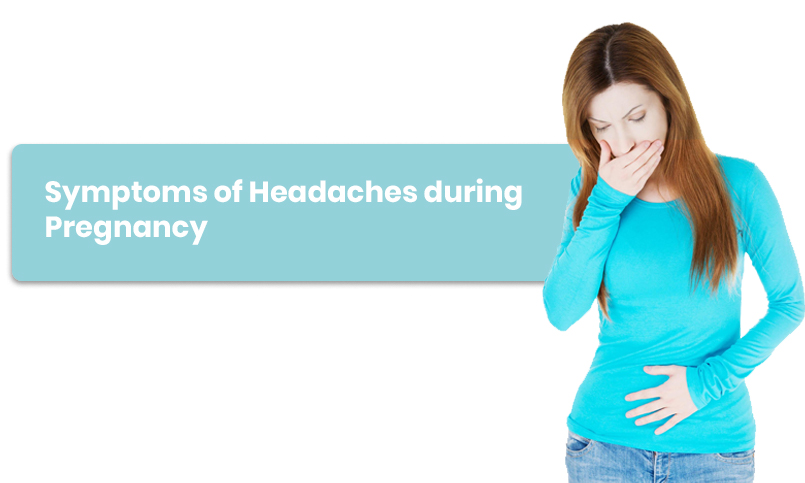Introduction
Headaches are one typical problem that many pregnant women experience. Even though headaches are usually regarded as normal during pregnancy, they can nevertheless be upsetting and worrying. We will examine the causes, signs, and available treatments for headaches during pregnancy in this post. And offer valuable knowledge to help pregnant women in managing this challenging part of their pregnancy journey.
Understanding Headaches during Pregnancy
Studies show that upto 40% of pregnant women may experience headaches at some point in their pregnancy. Hence, making them a typical occurrence. These headaches might differ in intensity, length, and frequency. They can also be accompanied by other symptoms such as exhaustion, light or sound sensitivity, and nausea.
Causes of Headaches During Pregnancy
Pregnancy-related headaches can occur from a number of causes, like:
- Hormonal Changes:
Hormone fluctuations, including those related to progesterone and estrogen, have been shown to cause headaches in pregnant women. These hormonal shifts, which are a normal aspect of pregnancy, can have an impact on pain perception. And on neurotransmitter levels, and blood flow too. - Increased Blood Volume:
The body produces extra blood during pregnancy to nourish the developing placenta and fetus. This increase in blood volume may cause hypertension. That in turn can worsen headaches, especially in those who have a tendency to high blood pressure. - Stress and Anxiety:
Pregnant women during their pregnancy, worry for both their own health and the wellbeing of their unborn child. Discomfort in pregnancy can be increased by stress and anxiety, which can show up as tension headaches or migraines. - Dehydration:
Because of their higher fluid requirements and hormonal changes that impact fluid balance, pregnant women are more vulnerable to dehydration. Because dehydration can worsen pre-existing symptoms and cause headaches, it is especially important to maintain adequate hydration throughout pregnancy.
- Lack of Sleep:
Pregnant women often have sleep problems because of physical discomfort, hormonal changes, and worry. Many of them have trouble sleeping or staying asleep. Insufficient sleep can worsen pre-existing headache symptoms and also cause new ones.
- Caffeine Withdrawal:
Because of worries about how caffeine may affect fetal development. Pregnant women may decide to restrict or completely avoid caffeine during their pregnancy. Reducing caffeine intake suddenly might cause withdrawal symptoms, such as headaches. - Sinus Congestion:
Because of the changes in hormones and increased blood flow during pregnancy, nasal congestion and sinus pressure can occur. Pain and pressure around the eyes, cheekbones, and forehead are the hallmarks of sinus headaches. And it can get worse as one’s posture or air pressure changes.
Symptoms of Headaches During Pregnancy
Pregnancy-related headaches can exhibit a range of symptoms, such as:
- Pulsating or throbbing pain
- Tightness or pressure in the head or temples
- Intolerance for light or sound
- Vomiting or feeling uncomfortable
- Abnormalities to the vision, such as spots or blurriness
- Tiredness or trouble focusing
- Tense muscles or stiff neck

During pregnancy, it’s important to monitor the frequency, intensity, and length of headaches. If they continue, are severe, or are accompanied by other worrisome symptoms, you should also seek medical assistance.
Treatment Options for Headaches during Pregnancy
Pregnancy headache management usually involves a mix of self-care techniques, lifestyle adjustments, and, occasionally, medicinal measures. The following are a few efficient methods of treating headaches during pregnancy:
1. Stay Hydrated:
Hydration will decrease frequency& intensity of headaches. And dehydration can be avoided by consuming enough water throughout the day. Drink eight glasses or more of water each day if you’re exercising or the weather is hot.
2. Practice Relaxation Techniques:
Headache symptoms can be reduced by using stress-reduction methods like yoga, progressive muscle relaxation, meditation, deep breathing, and meditation.
3. Get sufficient Rest:
To make sure you’re getting enough sleep each night, make sleep a priority and create a regular sleep schedule. To improve the quality of your sleep, make your bedroom comfortable, reduce screen time before bed. And engage in relaxation exercises.
4. Maintain a Balanced Diet:
To help control blood sugar levels and avoid headaches brought on by hunger. Have a range of nutrient-dense foods & well-balanced meals at regular time. Headaches have been related to magnesium shortage. So include foods high in magnesium, such as whole grains, nuts, seeds, and leafy greens.
5. Apply Cold Compresses:
To reduce discomfort, minimize swelling, and relieve headache symptoms. Use an ice pack or cold compress on the forehead or temples. And to prevent skin contact with ice, cover the cold pack with a towel or piece of fabric.
6. Practice Good Posture:
Bad posture can lead to tension headaches by putting excessive stress on the muscles of neck & shoulders. Adopt proper posture by sitting up straight, releasing tension from your shoulders. As well as taking multiple breaks to stretch and move.
7. Use Acupressure:
Using pressure on certain body parts to reduce pain and induce relaxation is known as acupressure. It is a traditional chinese medical practice. Headache symptoms can get reduced by applying light pressure to the LI4 acupressure point. It is present between thumb & index finger.
8. Consider Alternative Therapies:
Alternative therapies like massage therapy, acupuncture, chiropractic adjustments, and aromatherapy can provide relief from headaches for certain pregnant patients. See a trained healthcare professional before beginning any new therapies or treatments while you are pregnant.
9. Consult with Healthcare Provider:
See a healthcare professional for a complete assessment and individualized treatment plan if headaches worsen or continue. Your healthcare provider can suggest over-the-counter or prescription drugs, like acetaminophen or migraine-specific medicines. That are safe to take during pregnancy, depending on the underlying reason and severity of the headaches.
10. Monitor Blood Pressure:
Check your blood pressure closely the entire time you are pregnant.. As high blood pressure, or hypertension, might increase your risk of headaches and other problems. Get quick medical assistance if you have headaches along with high blood pressure, protein in your urine. And causes edema on your face and hands. These symptoms could indicate preeclampsia, a dangerous pregnancy complication.
Also Read: Neck Pain During Pregnancy
Conclusion
Headaches during pregnancy are a regular occurrence for many women during different stages of pregnancy. Even though pregnancy headaches are frequently harmless and reversible, they can nevertheless be unpleasant and interfere with everyday tasks. Pregnant women can effectively manage their symptoms and maximize their prenatal experience. By being aware of the origins, symptoms, and available treatments for headaches during pregnancy. There are several ways to reduce headaches and improve overall health during pregnancy. That includes drinking plenty of water and getting enough sleep to seeing a doctor when necessary.
FAQs
What are natural remedies for headaches during pregnancy?
Hydration, Rest, Acupressure, Massage, Cold or warm compresses, Eat regularly. Avoid caffeine, alcohol, MSG, and artificial sweeteners.
Q2: What causes headaches during pregnancy?
Ans: Headaches during pregnancy first trimester are because of:
Hormonal changes
Increased blood volume
Dehydration
Lack of sleep
Caffeine withdrawal
Low blood sugar
Q3: What types of headaches during pregnancy occur in women?
Ans: The different types of frequent headaches during pregnancy are:
Tension headaches
Migraines
Sinus headaches
Rebound headaches
Cluster headaches

